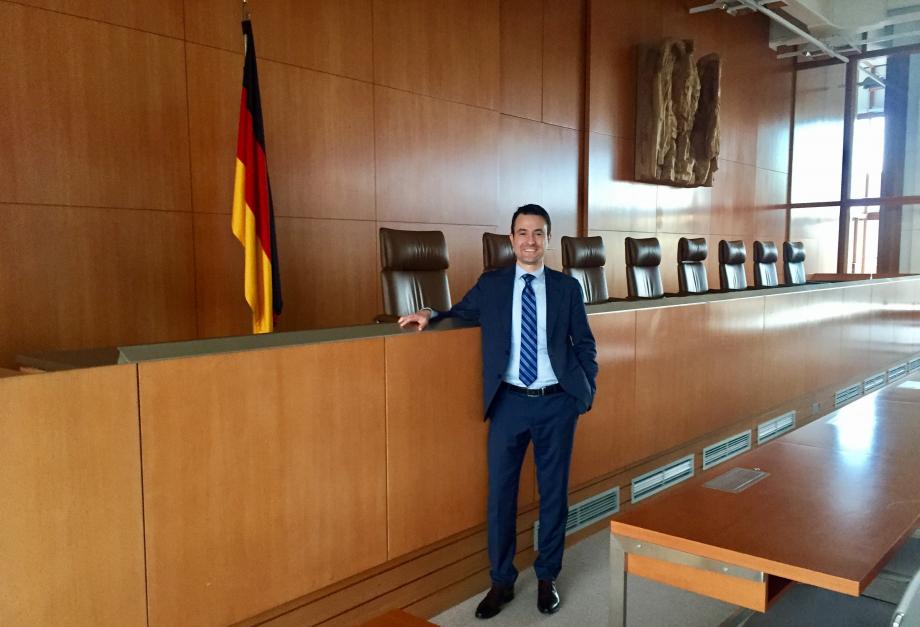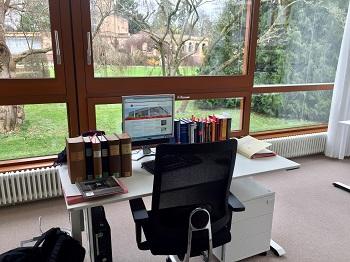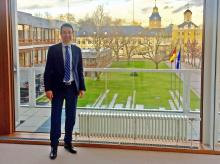JSD Student Gains Rare Look at Federal Constitutional Court in Germany

The research area was already set up when Law School JSD candidate Ramon Feldbrin, LLM ’16, arrived at the Federal Constitutional Court library in Karlsruhe, Germany, during the last week in January. There was a small desk lined with books and papers he’d requested and a window overlooking botanical gardens and an old castle.
It was the beginning of a remarkable week-long research trip—one that included two interviews with justices, a chance to observe one of the court’s infrequent but in-depth oral hearings, and an opportunity to expand his understanding of a judicial system in which constitutional cases are heard in a specialty court that intentionally exists far from other courts and federal institutions.
“It is pretty rare for a constitutional court to provide such access to a graduate student,” said Tom Ginsburg, the Leo Spitz Professor of International Law and one of Feldbrin’s advisors.
But Feldbrin, who is studying the procedural rules that courts apply in constitutional cases in the United States, Germany, and his native Israel, knew that a visit to the German court would add an important component to his research. So he asked to visit—and after learning about his research, the court said yes.
“In my few days at the court, I learned much more than I had reading for months,” Feldbrin said. “I saw how different the process is from what I know from Israel and from what I know and have read about in the US.”
Added Ginsburg: “We are incredibly grateful to the FCC for recognizing the merit of Ramon’s project. With their support, he is poised to make a major contribution to our understanding of constitutional procedure.”
During his visit, Feldbrin immersed himself in the procedures of the German constitutional court, which was created after World War II as an additional check on government power. The specialty court—which is more than 300 miles away from Berlin in Karlsruhe, a city on the French-German border—considers only constitutional cases, and any citizen is allowed to request the court’s review without the assistance of counsel.
The court’s library, which Feldbrin said isn’t open to the general public, gave him access to materials he couldn’t find elsewhere. The justices provided insight on the court, which is divided into two eight-judge senates. And the hearing—conducted in German, a language Feldbrin doesn’t speak—gave him the chance to witness court procedure firsthand.
“The fact that I don’t know German was actually an advantage because I was not distracted by the substantive arguments—instead I just witnessed how things are conducted, how the processes are handled,” he said. The hearing, which centered on whether a patient who had already been institutionalized in a psychiatric facility could be restrained without a court order, differed from what he’d seen in American and Israeli courts.
The format was more objective than adversarial, and lawyers played a smaller role, he said. Witnesses testified—often without interruption—for 30 to 40 minutes over the intensive two-day hearing.
“It was more like a [US] Senate investigation,” he said. “They weren’t trying to win, they were trying to solve a social problem.”
Feldbrin, who is still in the midst of his research, graduated in 2012 from the Hebrew University of Jerusalem with a degree in law and political science after completing three years of military service with the Israeli Defense Forces. He then worked at an Israeli law firm and, later, in clerkships on the Israeli Supreme Court, including a little more than a year as a senior law clerk to the chief justice. After receiving his LLM from the University of Chicago in 2016, Feldbrin spent a year clerking for US Bankruptcy Judge Christopher Sontchi, ’92, before returning to the Law School to pursue his JSD. His experience in both the United States and Israel sparked an interest in comparative analysis, and he began researching the different ways in which procedural rules were applied in constitutional cases. Germany’s unique judicial structure caught his attention early on, and it became a part of his study.
“The German FCC can think about constitutional issues separately, and [I wondered] how they might deal differently with them,” he said. “In [courts in] both Israel and the US, constitutional issues are intertwined with everything else.”

